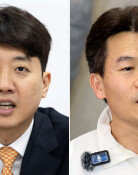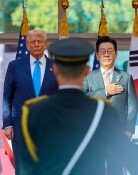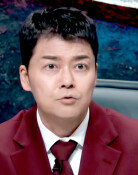MOCIE minister stresses long-term policy
MOCIE minister stresses long-term policy
Posted July. 17, 2000 23:35,
"A farsighted industrial policy should be established immediately.¡±
In six months after his inauguration as the head of the Ministry of Commerce, Industry and Energy (MOCIE), Minister Kim Young-Ho brought forward his views in an exclusive interview with Dong-A Ilbo.
During the dialogue, Minister Kim stressed that the nation¡¯s economic policy had put more focus on the financial sector, but more weight should be placed onto the future industrial policy. Dong-A hears about his opinion on the new industrial policy. Excerpts:
Q: What have been your impressions as the industrial minister?
A: I often have felt oppressed. Even I have considered quitting the job. Due to problematic framework for the formulation of economic policies, I have met lots of difficulties in fulfilling my duty. However, blaming the given conditions is useless. I will put forth every ounce of my energies.
Q: On which area would you like to put the biggest emphasis?
A: Korea has no real industrial policy. I feel most depressed when I think about with what would happen after the current flourishing semiconductor industry comes to an end. I want to rebuild the nation¡¯s economy by framing a proper industrial policy.
Q: Many people regard the ¡®industrial policy¡¯ as an outdated concept.
A: It is a misled understanding. The U.S. and Japan are also shaping industrial policies. Today¡¯s industrial policy is not for regulating the market, but for helping enhance the market constitution. Theoretically, that is the ¡®new industrial policy.¡¯
Q: What is the essential of the new industrial policy you are mapping out.
A: First of all, I will double the number of enterprises. Any perspective entrepreneurs are to be fully supported. The project to connect online with offline will be backed up by the government.
Q: What¡¯s the reason behind you suggested measures to foster incorporations?
A: That is to form a favorable environment under which corporations would be easily established. It is required to increase the number of small-sized enterprises with technological edge.
Q: Why is the new industrial policy needed?
A: The fact that we were pulled out of the International Monetary Fund¡¯s bailout program does not mean that our economy is completely recovered, but that we get a fire under control. The major forces driving the country to overcome the crisis were restrained imports, curbed labor costs, the strong won¡¯s value against the dollar and so-called ¡®hungry spirit¡¯ – people¡¯s mindset to willingly put up with austerity. But now, we don¡¯t have the four factors any more. From now on, we have to put forth with technology and competitiveness.
Q: You are told to worry about next year¡¯s trade account balance.
A: Unless we make an epoch-making stride in the level of industrial technology, we could soon face trade deficits. The trade deficit in the future will weigh much more heavily on the country ever than before. It will severely affect not only the international confidence on the country, but its stock market trends.
Q: Did the industrial policy affect the sale of Daewoo Motor ?
A: The conditions attached to the sale of Daewoo were forced to include the terms of technology transfer and establishment of global platforms. But it¡¯s not enough. The U.K.¡¯s automobile industry went to ruin primarily due to sale of automakers with no industrial strategies. We should put the priority of industry policy to that for local autopart manufacturers.
Q: Is there any countermeasure to reform the distorted price-decision scheme of local oil refining firms?
A: The root of the problem stems from the fact that the domestic oil refining market actually has a near monopolistic structure, not competitive one. Therefore, truly competitive scheme should be introduced. For the purpose, more oil refining firms have to join the market competition. Also, the government plans to introduce an oil price monitoring system, as well as establish an e-commerce network, enhancing transparency in transactions.
Q: What is your long-term energy policy?
A: We need to see things more from international point of view. The Southeast Asian pipeline project, which is under construction, is a truly colossal project, connecting South and North Koreas, Japan, Russia and China, which is the core of the economic cooperation in the Southeast Asian region.
Division of Korea Electricity Power Corp. (KEPCO) and its privatization, which have been the controversial issue of the nation¡¯s energy policy, are also a requirement for the long-term energy policy. I will propose the establishment of an independent energy policy office to exclusively handle the energy affairs.
Q: Are there any fruits of engrafting the traditional manufacturing industry onto the info-communications sector?
A: There are already enough e-commerce networks. From now on, it is more important how firms utilize the networks. The term ¡®e-business¡¯ will likely disappear, since ¡®business¡¯ gets identified with ¡®e-business.¡¯ In order to back up the e-commerce revolution of local firms, the MOCIE is push forth with a mindset that it is ready to wage a war for business-to-business (B2B) e-commerce in the next three years.







